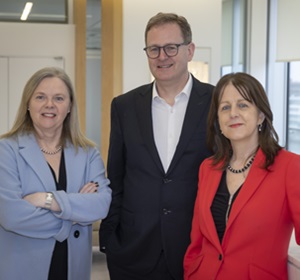Matheson / UCD Leadership Conference – "Regulating the digital economy, the nexus of law, innovation and business"
While the regulation of AI will be a top priority for the majority of Irish businesses during 2024, Ireland has a unique opportunity to act as a gateway between the EU and the US and to strike a balance between regulation and innovation in order to drive European competitiveness in the area of digital innovation.
That was just one outcome from the Matheson / UCD Leadership Series Event – "Regulating the digital economy – the nexus of law, innovation and business", held in UCD this week. The hybrid conference heard insights and experiences from leading professionals on the latest developments in the digital economy, from a regulatory, legal and business perspective.
An online and in-person poll of attendees showed that;
- Nearly 90% of respondents said that the burden of identifying rights and obligations under the latest digital regulation legislation has become more complex.
- Cybersecurity and Operational Resilience (37%); GDPR and Data Protection Law (27%) and AI regulation (23%) will be the top priorities in the digital landscape for respondents during 2024.
- Nearly one quarter of respondents (23%) have reviewed their insurance cover to include cover for new risks and obligations arising from digital regulatory changes.
- The vast majority of businesses (75%) are now required to engage with multiple regulators in dealing with regulatory compliance issues.
The conference featured a panel discussion on the topic of regulation. This was followed by a one-to-one conversation with Meta's Head of Public Policy in Ireland, Dualta Ó Broin. A second panel discussion then focused on antitrust, digital regulation and intersectionality issues, and looked at how businesses could navigate complexity and multi-regulator oversight. Conference chair, Carlo Salizzo, partner in Matheson's Technology and Innovation group also took the opportunity to introduce the launch of Matheson's new Digital Economy Group.
Carlo Salizzo, partner in Matheson's Technology and Innovation Group, and member of the firm's new Digital Economy Group said, "Matheson is honoured to once again host a Leadership Series event in conjunction with UCD. The area of digital transformation is a fast-changing and ever-developing one, and today's conference treated us to valuable insights from experts in the areas of regulation and business. We are delighted once again to partner with UCD in this Leadership Series, and I would like to thank Professor Laurent Pech from the UCD Sutherland School of Law and his UCD colleagues, who welcomed us so warmly here today."
Professor Laurent Pech, Dean of Law at the UCD Sutherland School of Law said; "Today's event is a great example of UCD and Matheson working together to discuss the most pressing legal issues relating to the regulation of the digital economy. The coming into force of the Digital Markets Act and the Digital Services Act is of special significance in this respect and indeed, these two EU legal instruments are already covered in our graduate curriculum as they are bound to create new obligations which lawyers and aspiring lawyers must be aware of."
"With Ireland's role as a centre for data protection regulation and content regulation also due to evolve when the Digital Services Act comes fully into force, close collaboration and engagement between academics from different fields and those within industry will be required more than ever", he said.
Regulation is at the heart of digital innovation
The first of the two panel discussions dealt with regulation. Chaired by Deirdre Crowley, partner in Matheson's Commercial Litigation department, it featured contributions from Niamh Hodnett, Online Safety Commissioner at Coimisiún na Meán; Katie O'Leary, Assistant Commissioner at the Data Protection Commission (DPC); and Michael Byrne, partner in Matheson's Commercial Litigation department.
Recently appointed Commissioner for Online Safety Niamh Hodnett, spoke about the significant breadth of Coimisiún na Meán's regulatory responsibilities, which span key digital economy legislation from the Digital Services Act to the Online Safety and Media Regulation Act and the EU Anti-Terrorism Regulation. She also said that the legal landscape around what constitutes harmful and illegal content is a concept that will develop over time and welcomed the publication of the online safety codes in this respect in due course.
Assistant Commissioner Katie O'Leary from the DPC discussed the important and welcome consultations taking place to establish a regulatory cooperation group in the digital services space. Finally, we heard about the new wave of digital economy-related litigation that is coming in the near future.
Opportunity for Ireland to be a bridge
Next, the attendees saw a one-to-one conversation between Dualta Ó Broin, Head of Public Policy for Ireland at Meta and Matheson partner, Carlo Salizzo. Ó Broin spoke about the potential for Ireland to build on its role as the “transatlantic bridge” to encourage further engagement between the US and Europe to bring closer cooperation in the area of digital regulation and new technologies such as AI.
He said, "there is a balance to be struck by the European Union between the excellent progress which has been made in the important area of regulation, by the co-legislators and bodies such as Coimisiún na Meán and the Data Protection Commission in Ireland, with the need to encourage innovation and the future competitiveness of Europe at a global level."
Compliance and antitrust enforcement
A second panel discussion, chaired by Calum Warren, partner in Matheson's Competition & Regulation department, heard from Úna Butler, of the Competition and Consumer Protection Commission (CCPC); Eoin Kealy, Head of Compliance at Ryanair; Alexandre de Streel, CREEE Academic Director at the University of Namur; and Ian O'Mara, partner in Matheson's Financial Institutions Group. The panel discussed how antitrust remains a key pillar of the overall digital regulation landscape and how general antitrust enforcement, the Digital Markets Act and other digital regulation legislation (in particular, the Data Governance Act and the draft Data Act) sit alongside each other.
The panel also discussed the intersectionality between compliance obligations under the various regulatory regimes including the GDPR and how this could give rise to questions in the context of the future administration of these regulatory regimes.
Attendees also heard about the CCPC's enforcement priorities under its new competition regime, its expected role in the administration of the Digital Markets Act (DMA) and the fora through which the CCPC will continue to liaise with other Irish and EU regulators. Finally, attendees also heard about how antitrust enforcement and digital regulation is impacting the travel and fintech sectors.
Matheson's Digital Economy Group
Matheson partner, Carlo Salizzo, who chaired the event, took the opportunity to introduce Matheson's new Digital Economy Group, a collaborative group of experts from across a wide variety of practice areas who are at the cutting edge of legal experience and innovation in the digital area. He outlined how the new group of senior Matheson partners will ensure that Matheson's clients will come to connect with the right team. "We have taken the opportunity to create a unique group of experts to help our clients. Because this is not a neat package of legal reforms which stays within strictly defined boundaries, having access to diverse and expert group will ensure that our clients can interact with the right team to meet their specific demands, whether that be a new product launch, a compliance project or a response to an incident."
"We are excited about what this means for our industry, and about the opportunities that new technologies will bring for us to work on the most interesting, challenging and cutting-edge legal matters with our clients," he said.






